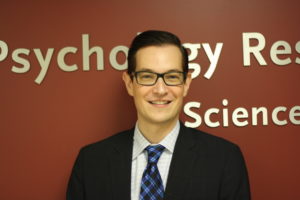 Dr. Trevor Hart was raised to believe that he had a responsibility to improve the world.
Dr. Trevor Hart was raised to believe that he had a responsibility to improve the world.
So when it was time to make a career choice, he felt he could make the greatest impact as a clinical psychologist.
“Clinical research was one way that I could work with large numbers of clients, dramatically extending my ability to help people beyond what I could do in private practice,” explains Dr. Hart, who recently received the CAHR-CANFAR Excellence in Research Award in the Social Sciences Stream.
Dr. Hart, who is now the OHTN Chair in Gay and Bisexual Men’s Health, director of the HIV Prevention Lab and professor in the Department of Psychology at Ryerson University, started his career as a student clinician at a youth centre for LGBTQ youth.
Here, he was inspired to work in the field of HIV research.
“(I) noticed that most of my patients faced not only mental health disorders, but also social inequities and oppression, including HIV stigma,” says Dr. Hart. “I wanted to do research that could help improve the health and well-being of gay, bisexual, and other men who have sex with men (MSM), including men living with HIV.”
For more than 15 years, Dr. Hart’s research has combined epidemiological approaches that help researchers understand the challenges faced by gay, bisexual, and other men who have sex with men, and clinical trials to develop and test counselling programs and psychotherapies to reduce health disparities and promote resilience in this population.
“The most rewarding moments are hearing the stories of men who come in to therapy or counselling feeling lonely, anxious, and desperate, and leave feeling more empowered and with better quality of life,” he says.
Among his many research accomplishments, Dr. Hart founded the GPS counselling program – which helps gay, bisexual and other men who have sex with men who are living with HIV to identify and find their own way toward sexual health and well-being.
He says the GPS counselling program was developed using community-based research methods.
“This program has been well received by the community, and has led to a sea change in how MSM outreach workers provide counselling to their clients in Ontario and in several other settings in Canada,” Dr. Hart says. “MSM outreach workers, who often previously used either a didactic, condom provision-focused, or an ad hoc approach toward counselling, now regularly offer motivational interviewing, which is the core counselling method in GPS.”
Motivational interviewing, he explains, is a client-centred method that allows the client to choose his/her/their own goals.
“Motivational interviewing leads to better client engagement in health behaviour change and self-care, than when a counsellor tries to persuade a client to change,” he says.
In his latest research project, Dr. Hart is starting a new randomized controlled trial of a therapy for men with high anxiety in social situations who want to reduce their risk of getting HIV and STIs, but who do not want to use PrEP.
Dr. Hart hopes his overall research will lead to continued transformative change in gay, bisexual, and MSM communities across Canada and beyond.
“I also hope that my work, although rooted currently in my focus on gay, bisexual, and other MSM, will also help others who suffer and who want support. My goal is to help people, and I hope that the research leads to lasting social change and improvements in our peoples’ lives.”
Dr. Hart says he has had many mentors along the way, particularly as a graduate student and postdoctoral fellow – including his graduate mentor, Dr. Rick Heimberg, and his postdoctoral mentors, Drs. Gene Farber, David Purcell, Rich Wolitski, and Ron Stall.
“(I am also) indebted to my amazing colleagues, staff, students, and participants who help me on this journey to support members of the community,” says Dr. Hart, adding that he was thrilled to hear that he was a CAHR-CANFAR Excellence in Research Award recipient.
“I was really excited and honoured to receive an award from two amazing organizations that do so much to promote HIV research in Canada.”
